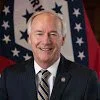LITTLE ROCK – As 2022 comes to an end, I have been reflecting on my time as Governor and looking forward to what is ahead.
In January, I announced my W.I.N.S. initiative for my final year as Governor. Each letter in W.I.N.S. stands for a pillar that I have focused on to boost Arkansas to success. Workforce Training, Infrastructure, New Economy Jobs, and Strengthening Arkansas Families all aim to push Arkansas to being the best place the state can be – and help Arkansas WIN.
Arkansas has continually grown economically over the past eight years. Thanks to the people of Arkansas, we have made this state one of the premier locations for business owners to put their roots down and conduct business that gives well-paying jobs to hard-working Arkansans and puts more money into our state.
As this year and my term is coming to an end, Arkansas has never been in better financial shape than we are right now. We have lowered taxes, funded services, and we have over $2 billion in reserve accounts.
Even in the face of a pandemic, the state’s economy, like Arkansans themselves, remained resilient. In 2021, Arkansas was ranked number two in the nation for states with the most pandemic-proof small businesses. That speaks not only to the hard work of business owners who have chosen to live in Arkansas, but to the small business environment, workforce support, and resource access our state’s infrastructure had in place, ready to help small businesses.
Arkansas small businesses were rightfully ranked as having the greatest potential to bounce back because they had the least to bounce back from. Arkansas never shut down throughout the pandemic. Our state kept working, and our consistently low unemployment rate over the past few years reflects that. In fact, there are over 120,000 more people employed now than when I took office in January 2015.
The future success of our state demands that we improve the training of our workforce. Now with initiatives like the ‘Ready for Life’ program, it is easier for employees and employers to find each other, and it will offer business leaders a quick snapshot of the employee pool in Arkansas as they recruit talent.
Our infrastructure is the backbone of everyday operations in this state, and it is worth investing in to create a better quality of living. That is why we have invested almost $500 million in rural broadband expansion in our state.
In terms of new economy jobs, we expanded our high-tech jobs from the steel industry to software development, and this growth will continue with the recommendations from the Council on Future Mobility Report.
Lastly, but certainly not least of the pillars of my W.I.N.S. initiative – strengthening Arkansas families. Over the past year, my focus has been to give families the best chance of success and to protect Arkansas children from child abuse and crime.
In November, I announced a monumental expansion in rural health services with the ARHOME Medicaid program. Thanks to the great work of the teams at the Arkansas Department of Human Services, Life360 HOMEs will address the complex challenges facing many of Arkansas’s most vulnerable residents, including individuals in rural areas with serious mental illness and those in need of addiction services. I look forward to watching the full potential of this transformative program as it unfolds in the months and years to come.
As we conclude 2022, I am grateful for the W.I.N.S. we have had this year in improving our workforce, investing in our infrastructure, creating new economy jobs, and strengthening Arkansas families.


